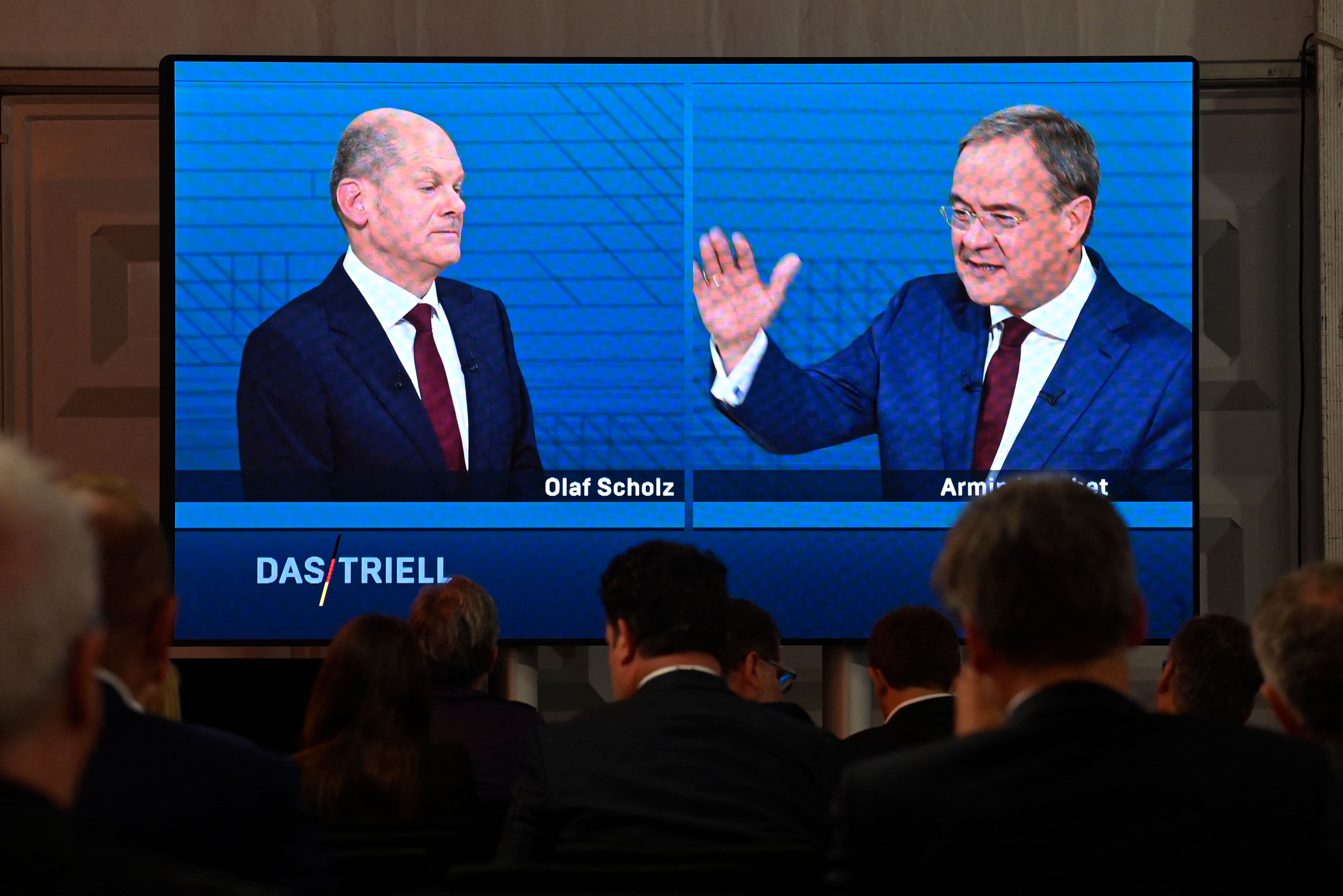
Journalists and party members watch on a screen from the press centre (L-R) Olaf Scholz, German Finance Minister, Vice-Chancellor and the Social Democrats (SPD) candidate for Chancellor and Armin Laschet, North Rhine-Westphalia’s State Premier and the Christian Democratic Union (CDU) candidate for Chancellor as they attend an election TV debate in Berlin on September 12.
JOHN MACDOUGALL | AFP | Getty Images
Germany’s election race stepped up a gear on Sunday night during a heated TV debate between the three contenders vying to lead the country after the Sept. 26 vote.
Olaf Scholz, Germany’s current finance minister and the candidate for the Socialist Democratic Party, which is currently leading voter polls, put up a solid performance against rivals during the debate despite questions over his running of the finance ministry.
A snap poll of 1,750 viewers by broadcaster ARD on Sunday night found that 41% of viewers found the SPD’s Scholz the most convincing performer during the 90-minute so-called “Triell” – or “trial” – of the candidates. That was ahead of 27% for Armin Laschet — the candidate for the Christian Democratic Union and its sister party the Christian Social Union —and 25% for the Greens’ candidate Annalena Baerbock.
The debate, whose tone was described as “aggressive” by the German media, was seen largely as a duel between Scholz and Laschet, with Baerbock having occasional moments in the fray. One ARD Berlin correspondent described the debate as “two men arguing,” while the Bild newspaper characterized the debate as a “poll victory for Scholz [but] Laschet fights, fights, fights.”
Laschet — who the CDU/CSU hopes can succeed outgoing Chancellor Angela Merkel — certainly used the debate as an opportunity to attack Scholz’s record in the finance ministry, days after German prosecutors raided the finance and justice ministries as part of a probe into the Financial Intelligence Unit, an anti-money laundering agency overseen by the finance ministry.
At one point in the debate Laschet accused Scholz of failing in his supervision of the FIU, telling Scholz: “If my finance minister worked like you, we would have a serious problem.” Scholz refuted the accusations and accused Laschet of creating a “false impression” and twisting the facts surrounding the raids.
“You can see how things are being misrepresented,” Scholz said on Sunday evening. “Mr Laschet you have to take the blame for that very clearly. There was no investigation of the Federal Ministry of Finance and it’s not the case that the public prosecutor’s office … had any questions in an investigation against this ministry or the Ministry of Justice. You created this false impression on purpose,” he said.
Viewers appeared to remain confident in Scholz’s ability to handle the responsibilities of high office, with 49% saying in the post-debate snap poll that they found him the most competent of the candidates, compared to 26% for Laschet and 18% for Baerbock.
Most viewers (39%) found the Greens’ candidate the most likeable of the three contenders, although Scholz was not far behind, with 34%. Laschet’s likeability rating was a low 18%, however, a rating which ARD said could have been because of his more aggressive debating style and interrupting of the other contenders.
Separately, an election opinion poll published Sunday for the Bild am Sonntag newspaper showed that the SPD had extended their lead over the conservatives to six points. The INSA survey of 1,152 people last week gave the SPD get 26% of the vote, while the conservatives were behind with 20%, and the Greens at 15%.
Voters decided?
Experts say that the race to become Merkel’s successor remains open, with many postal ballots already cast amid an unprecedented level of postal voting this year.
Fabrice Pothier, chief strategy officer at political consultancy Rasmussen Global, told CNBC on Monday that most people had made up their minds already about who to vote for. He noted on Monday that “voting day is in two weeks’ time but a large proportion of German people have already voted so in a way it’s a campaign where every day is voting day.”
“That’s why the result may be unpredictable, and [the vote in] Germany matters simply because it’s the largest economy and the largest decision-maker on European affairs,” he told CNBC’s Squawk Box Europe on Monday.
With the imminent departure of Merkel, Europe’s de-facto leader when it comes to geopolitics, the next leader of Germany will have their work cut out, trying to establish new relations other global powers at a time of changing dynamics in international affairs.
“The key issue on the agenda is currently Europe’s role within the new geopolitical contest that’s going on between the U.S. and China,” Janka Oertel, senior policy fellow at the European Council on Foreign Relations, told CNBC on Monday.
“That is particularly relevant for the German economy which is very much invested in both markets and is the leading economy in Europe,” she added.
“So for any successor to Merkel, how to position Europe and how to position Germany within Europe; and within these difficult questions of a de-coupling, of a deglobalization economy; for a country like Germany, that is so heavily dependent on external trade, these are the biggest questions on the agenda.”




